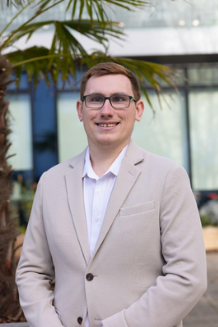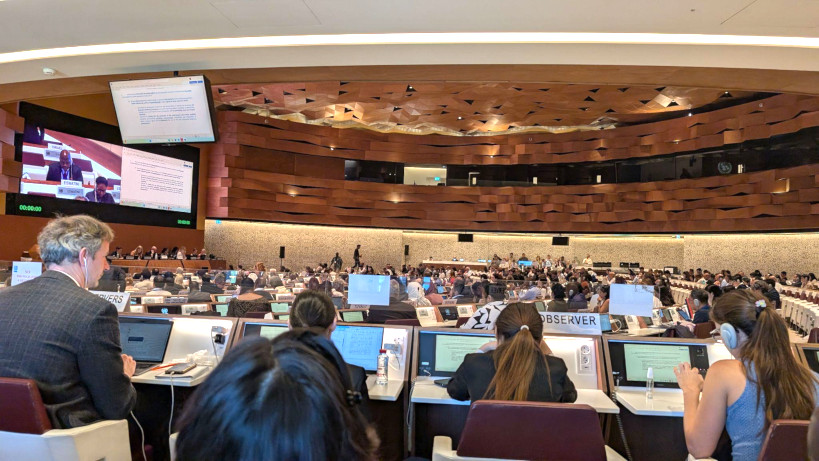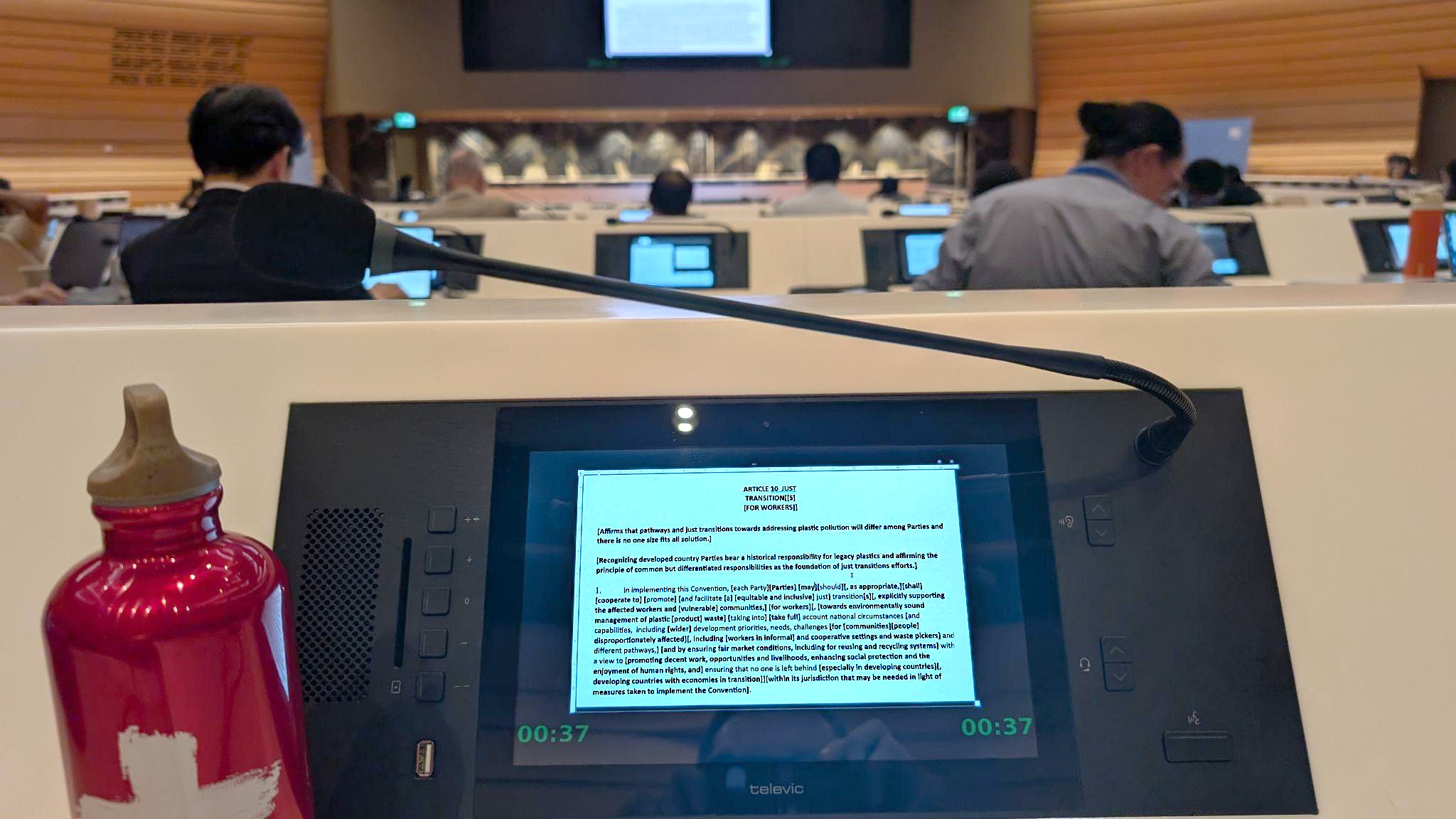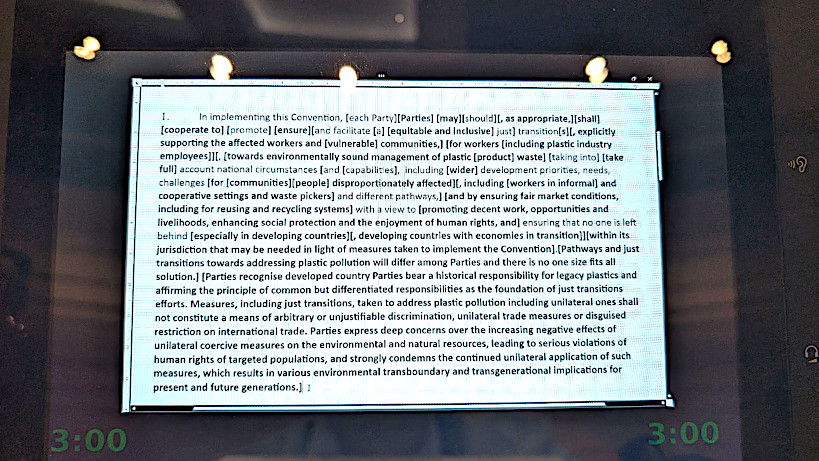
After three days of talks the fundamental differences between a majority of delegates who came to Geneva because they wanted a strong treaty and a minority who did not are strongly evident. This is expressed both in disagreements over basics such as whether a just transition is a desirable and in procedural quibbles. Both types of disagreement are costing valuable time. Sam Winton chronicles the frustrations faced by delegates and how those who do want a meaningful treaty are attempting to overcome them.
‘It seems like we have reached a new level of procedural purgatory’. This was the opinion of one member at 8pm on the second day of deliberations in Contact Group 1 and it is hard to disagree. Now, at the end of the third day of contact group deliberations, some limited progress is being made but its continuation is as endangered as the nearby Alpine glaciers and moving at a similar pace.
In the last 2 days I have attended 3 sessions of Contact Group 1. Conversation on Wednesday morning focussed on Article 3 – Plastic Products. This is a deeply controversial article which could deal with both problematic plastic products and chemicals of concern. Members broadly support one of 2 proposals for this article. A proposal submitted by Switzerland and Mexico and supported by 78 members would set out criteria for the listing of products and chemicals which would be subject to phase outs. The proposal would include a transparent and science driven process for adding to those lists. A smaller group of members have coalesced around a Russian proposal which would target only the most polluting products where there is clear evidence that a global response is necessary. They also reject any reference to control of chemicals or perceived interactions with trade. The one area with broad convergence in this article is general support for national reporting mechanisms.

Contact Group 1 convening to discuss Article 3 – Plastic Products Photo: Samuel Winton
Some countries reject globally binding lists with one member stating that they are ‘not interested in a global regulatory approach at all’. This area of discussion led to some heated exchanges with one member stating that ‘the correct response to divergence is not a lowest common denominator approach’ and another stating ‘to those countries who do not want global measures please step aside and negotiate your own agreement’. Despite this, divergence was not the primary block to progress. Instead this has been a lack of agreement on how to move forward. There was increasing frustration that the group was hearing general comments instead of undertaking line-by-line edits. After a morning session with little progress, members agreed to move to a lunchtime informal consultation which took place behind closed doors.
When Contact Group 1 discussions resumed on Wednesday evening we unfortunately encountered further procedural pain. Reports back from the informal session revealed slow and limited progress. The co-facilitators of the informal discussion proposed to create a streamlined text based on their discussions but it was immediately clear that members felt this would be premature. Further informal discussions will therefore be required. However, several members expressed displeasure with how the informal discussion was convened, specifically referencing members trying to block the introduction of bridging proposals if they were not satisfied with their content. Reading between the lines it appears clear that less ambitious countries were trying to avoid any discussion of the Switzerland/Mexico proposal.
The remainder of the session should have been spent discussing Article 5 on Product Design. Unfortunately, very little substance was discussed with members instead arguing about how to proceed with the negotiations. The session began with the presentations of 3 proposals which had been pre-submitted by the UK/Chile, Russia and Brazil. When the co-facilitators announced that they had already done the work of integrating these submissions into the text and proposed starting line-by-line negotiations, a small group of members objected and we instead had to endure further, time consuming general comments. After discussion it became apparent that all members were in favor of commencing line-by-line edits. However a very small number of members were insisting on the submissions already presented being verbally read-in, rather than saving time and using the merged text already created by the co-facilitators. It is important to note that, as the proposals had already been presented they had met the procedural requirement for incorporation into the text. Therefore, this delay was entirely unnecessary and only served to waste valuable time. Unfortunately, due to confusion, the use of procedure to delay the process by some members and some unusually passive chairing, by 10pm we concluded the session with an agreement to conduct line-by-line edits on Day 3, a lot of wasted time and an extremely frustrated group of negotiators.

Line-by-line edits commencing for Article 10 – Just Transitions Photo: Sam Winton
Day 3 has finally broken free of procedural deadlock with line-by-line edits beginning. Despite some requests by members to move to informal sessions, this work has been largely conducted in contact groups. I continued to attend Contact Group 1 in the afternoon session and visited Contact Group 2 for the first time in the evening. The key headline has been a re-proliferation of brackets turning neat 3-4 line paragraphs into 15-20 line, unreadable messes. One delegate in Contact Group 1 noted that a paragraph had become so confused that they could no longer see head or tail. Contact Group 2 was arguably even more problematic with an abundance of new text being added which is at best tangentially relevant to the provision being discussed, and often so controversial that there is no chance of it ever being kept in a final treaty text. This was despite repeated pleas, initially from the co-facilitators, but increasingly also from the floor to refrain from making such suggestions. While I will not dwell too much on the relatively technical discussions of the day here, I do want to make reference to the conversations on Just Transition I attended in Contact Group 2. For many countries a strong article here is a red line and it is pleasing to see strong interventions including one member who stated ‘We think just transition is not merely a matter of domestic policy but requires international co-operation’. However, there have been proposals to weaken the text to the point of it being entirely ineffective and there is continued debate about whether parties ‘should’ or ‘shall’ ensure a just transition.

The output of 90 minutes of line-by-line editing of Paragraph 1 in Article 10 with the text being displayed on the conference room screens. This paragraph was originally just 3 lines long reading: In implementing this Convention, each Party should promote and facilitate a just transition, taking into account national circumstances and capabilities, including development priorities, needs, challenges and different pathways, with a view to ensuring that no one is left behind. Photo: Sam Winton
Moving forward, Friday is the last day of the first round of contact group discussions with all contact groups rapidly running out of time to create clean text for Saturday’s stock taking plenary. In Contact Group 2 alone there are 4 different informal consultations established, one for each of the articles under its remit, and other contact groups have similar workloads in addition to their regularly scheduled contact group meetings. The strain this is placing, particularly on smaller delegations is extreme. Delegations have been begged to avoid holding to to intransigent positions by co-facilitators though I see little evidence of this occurring.
My next report will come after Saturday’s stocktaking plenary where what to expect in the second half of these negotiations should become clearer. I continue to believe that there are 2 groups of members who would accept 2 very different treaties. While a majority would have robust and challenging but, I believe, ultimately ambitious discussions including upstream measures, a smaller number of countries will only accept waste management and voluntary targets. I still do not believe that there is a possible landing zone unless the ambitious members capitulate. I have heard rumours that ambitious countries may be investigating procedural ways to break through this deadlock and retain hope that these may be utilised in Saturday’s plenary. For now we have to wait and see how the coming days progress.
BIO
I am a postgraduate researcher working for the Revolution Plastics Institute at the University of Portsmouth since its creation in 2020. In 2023 I commenced my PhD studies titled ‘To what extent has the structure and implementation of the INC process facilitated the development of an effective Global Plastics Treaty?’ at the University of Portsmouth and the University of Surrey. This research will focus on how the structure and implementation of the INC process impact the treaty’s outcome, consider how the inclusion of stakeholders in the process influences a fair and just treaty, and investigate the implications of the final text for members. With a background in environmental hazards and community preparedness, my main research focus is working with communities and a broad range of stakeholders to tackle environmental challenges. I have also worked with international organisations to create policies to tackle the global plastics problem and facilitate sustainable development.

Thanks for sharing such helpful instructions, really appreciate your help.